
28 Aug, 2013
Zambia, Zimbabwe launch borderless two-nations, one-convention concept
Livingstone/Victoria Falls – In an unprecedented show of cooperation, two landlocked African countries divided by a border which runs through one of the world’s most spectacular natural heritage sites set aside their border formalities in order to facilitate what became arguably the world’s first borderless travel & tourism convention.
Between 24-29 August, delegates attending the UN World Tourism Organization 20th General Assembly (GA) were allowed to freely criss-cross between Zimbabwe and Zambia, shuttling around the roughly 15 hotels in the vicinity of the spectacular Victoria Falls. It was a mind-boggling experience to watch uniformed border guards waving the vehicles through open gates. Said UNWTO Secretary-General Dr Taleb Rifai, “History has been made in this part of Africa.”
| Travel Impact Newswire Executive Editor Imtiaz Muqbil was the only Asia-based travel journalist invited to cover the UNWTO’s 20th General Assembly. |
Approval for this unprecedented step had to be secured at the highest level, and underscored the political will to make the event a success. The two presidents who made this history, Robert Mugabe of Zimbabwe and Michael Chilufya Sata of Zambia, reflected on the partnership in their remarks at the opening ceremony. Said Mr Mugabe: The GA “constitutes for us an important milestone in the economic history of Zambia and Zimbabwe, and the Southern African Development Community (SADC) region. We expect it to leave an indelible mark on our memories, and that it be part of our generational legacy, marking a clear turning point in the tourism fortunes of our two countries, our region and indeed our continent.”
Added Mr Sata, “The co-hosting of this important tourism conference is a clear testimony of our commitment to exploiting the regional potential of the tourism sector.” He said he looked to “other regions of Africa that have not done so to host similar events in future in accordance with the principle of rotation and collective ownership of the UNWTO by member states.”
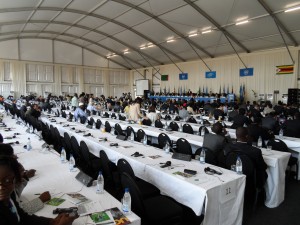 |
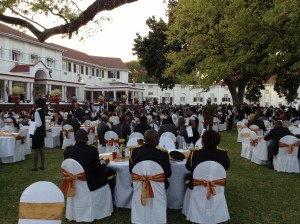 |
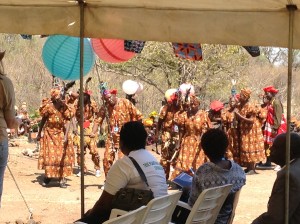 |
 |
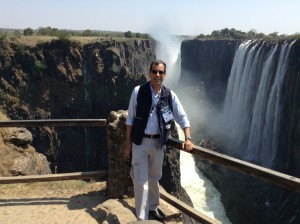 |
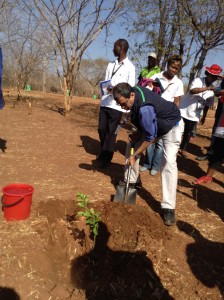 |
The Victoria Falls, a UNESCO World Heritage site, is one of the world’s most astounding tourism spots. The Zimbabwe-Zambia border cuts right through the 108-meter deep gorge, shared by two national parks – the Mosi-Oa-Tunya National Park on the Zambian side and the Victoria Falls Park in Zimbabwe. Selecting this as the best place to host the GA was designed to send a clear message about the future of tourism to Africa. The strategy worked. The first General Assembly ever hosted in Southern Africa generated the largest turnout in UNWTO history, with more than 700 delegates from 112 countries. It was also only the second time the GA convened in Africa; Senegal hosted the 16th GA session in 2005.
Said Dr Rifai, “The mighty Victoria Falls are an inspiring backdrop to celebrate these milestones, reaffirm our commitment to place tourism high in the political and economic agendas and ensure that we cooperate ever more to promote policies that ensure the sustainable and inclusive growth of tourism.” He also noted that moving the GA away from big cities to smaller townships was also an important step.
Indeed the two countries are keen to expedite tourism’s role for creating jobs, community development, investment and export earnings in the developing nations of Africa. Dr Rifai noted that international tourist arrivals in Africa grew from 15 million in 1990 to 52 million in 2012 while exports from international tourism reached US$ 34 billion in 2012 up from a mere US$ 6 billion in 1990. By 2030, international tourist arrivals to Africa a projected to reach 134 million.
However, Mr Mugabe said it was of “great concern to us” that the Africa, in spite of its massive natural and cultural tourism resources, comprised a miniscule 4% share of the 2012 global tourism revenues. He said it was in order to get this figure up that he had given his “full support, without reservation, to the Zambia-Zimbabwe bid” for the GA. He said, the GA “will inspire us in our ongoing and continuous efforts to maintain friendly relations with the whole international community, even with those countries with which we may not agree on all matters.”
True to style, Mr Mugabe had a wider message for his “political and economic detractors.” He noted that Zimbabwe had in fact recognised the importance of tourism as far back as 1981, when it joined the UNWTO, and remained an active member until 1999. After that, Mr Mugabe said, the country faced “immense challenges” between 2000-08 due “in large part to the illegal debilitating sanctions imposed upon us by some sections of the West. These sanctions sadly came hard on the heels of the IMF/World Bank’s ill-conceived economic structural adjustment programme (ESAP) that, among other things disabled our active participation in bodies like the UNWTO.”
“Happily in 2009, with the facilitation of the SADC and the African Union (AU), we formed a government of national unity, the GNU, which led to the somewhat softening of the stances against us on the part our political and economic detractors.” A new Ministry of Tourism and Hospitality Industry then swiftly reactivated membership of the UNWTO and proceeded to become a very active member, acquiring a seat on the Executive Council the same year.
The 20th UNWTO GA comes against the backdrop of a huge rush into Africa by China, India, Europe, the United States and Japan. Billions of dollars are set to pour into the continent as part of efforts to tap its natural resources, grow the purchasing power of its emerging young population and influence its international relations and geopolitical policies. A few days before the GA, the 5th Tokyo International Conference on African Development (TICAD) was held in Yokohama, Japan, with the country’s prime minister pledging to support African growth with approximately US$32 billion in aid. Japan says it wants to accelerate capacity development for infrastructure, human resource, science and technology and tourism.
For the Zambians, tourism is a major opportunity to reduce dependence on copper. The country’s economic fortunes fluctuate with the rise and fall of global copper prices. Moreover, copper is a depletable and non-renewable resource. Not tourism, which thrives off potentially infinite natural and cultural resources, if preserved carefully. Just before the GA, an investment forum was held in Zambia by the Ministry of Commerce, Trade and Industry under the theme “Harnessing tourism opportunities for wealth and job creation.” In turn, the Zimbabwe Ministry of Economic Planning and Investment Promotion also launched a handbook to promote resorts, convention facilities, conservation areas, sustainable community-based enterprises and service suppliers. Comparatively, Zimbabwe’s gold and diamond resources make it a richer country, but the added cash flow from tourism is much more effective at permeating through to the grassroots.
The GA itself has created jobs in its own way. At the Victoria Falls, our 19-year-old guide had just passed school and was doing this part-time job to raise funds for a university education. Another guide was a 28-year-old mother of two whose husband, a former electrician, had quit his hotel job in Livingstone to find a better-paying job in the northern Zambian copperbelt area.
Another 100 jobs were created for rehabilitation of infrastructure at the Victoria Falls Site in time for the meeting. According to a report in the Zambia Daily Mail, the Government released about six million Zambian kwacha (about US$1.1 million) to build an 800-metre steel fence from the Victoria Falls Bridge to Zambezi Sun Hotel, a modern curio market, a public lavatory, walk ways, an information centre and improved vehicle parking. Zambian Minister of Chiefs and Traditional Affairs Nkandu Luo urged Livingstone residents to help protect the structures. She said she was particularly happy with the curio market which would allow traders an alternative to the makeshift stores where they have been selling their wares for years. She commended the National Heritage Conservation Commission (NHCC) and the contractors. “The works are very good, we’re good at construction but since we’re also good at destruction, I will be coming frequently to inspect, especially the toilets,” she was quoted as saying.
The GA is being sponsored by a flotilla of private companies, including beverage and alcohol products, telecom and finance firms. The opening ceremony and the first two days of events were held on the Zimbabwe side of the border at what appeared to be a large makeshift facility in the grounds of the Elephant Hills hotel. The remaining two days of events and the closing ceremony were held at the Zambian side in the function rooms of the Zambezi Sun and Livingstone Hotels. No additional facilities were needed on the Zambian side as most of the delegations had left.
In most cases, everything went off well. Internet connections were excellent, with easy access in hotel rooms and conference areas. Even at Lusaka airport, where many delegates had to catch connecting flights to Livingstone, an internet network was available in the public areas, greatly facilitating contact without incurring roaming charges.
However, there were glitches. Some delegates turned up to find they had no hotel rooms. Shuttle services between the many hotels were confusing on the first two days when attendance was at its peak, but gradually improved. The opening ceremony speeches and entertainment ran nearly two hours over time, delaying the dinner and leading to agitated delegates standing in long queues when the buffet opened. A number of complimentary tours and technical visits were abruptly rescheduled without proper notice, leaving several delegates furious.
The two overarching subjects of discussion at the GA were visa facilitation and boosting air-connectivity. A closed-door ministerial roundtable focussed entirely on how to deal with visa issues. In turn, the plenary sessions focussed on the theme of air-connectivity. Both allowed an open exchange of ideas that will provide valuable feedstock for tourism ministers to pressure their respective immigration and aviation authorities to further loosen chokeholds and facilitate free movement of peoples.
Numerous financial and structural changes being approved at the GA will impact on UNWTO activities in the next four years of Dr Taleb Rifai’s stewardship. For this editor, one memorable moment was the inauguration prayer by a prominent Zimbabwe pastor. He prayed that the delegates look beyond merely recognising the economic value of the Victoria Falls and hail the glory of He who created them, the force commonly referred to as “Mother Nature”. He also prayed for the fruits of travel & tourism to be passed on to the less-privileged members of society and for the ministers to be blessed not just with the knowledge but the “wisdom” to do their jobs.
Because the best policies can always do with a bit of Divine help to succeed, I joined the pastor in praying for his prayers to be granted.



Liked this article? Share it!